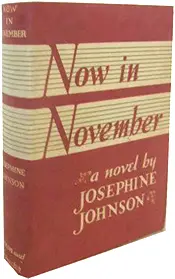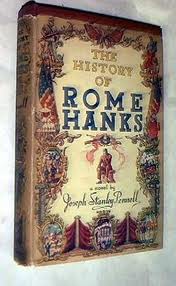Of all the pleasures that compensate a bookshop owner for his low wages none can beat introducing customers to books they were unaware of, and then, after a couple of weeks, hearing a happy review. I am not extremely well read, owing both to my weakness for watching sports and to the plodding pace of my reading. But what I lack in quantity, I try to make up in quality. I don’t waste very much time on lame books. And I am pulled magnetically toward books that have been lost, or forgotten; books that are unlikely to be familiar to most of my customers. Here are two examples that have recently been discussed in my store:
 Every month AbeBooks sends out an email touting the 10 most expensive books they sold in the past month. This week, one book caught my eye: “Now in November,” by Josephine Johnson, which sold for $6,500. It was gratifying to see such a fantastic price for a book (signed, first printing) that has been so decisively abandoned by the reading public. Johnson won the 1935 Pulitzer for this, her first book, when she was just 24 years old. But it was “The Grapes of Wrath,” four years later that became the unofficial book of the Dust Bowl, and “November” soon vanished just like the dust, and like the wretched farmers whose story Johnson tells. But, it shouldn’t have vanished. It’s a great book, and one that might enliven modern curricula, were it to be disinterred. I mention this only because I recently had the pleasure of recommending Johnson’s book to a customer, and being rewarded by her thankful response. What really sold her on the book was the fact that it is from what you might call a Golden Age of women writers of American fiction , at least as far as the Pulitzer is concerned. Johnson’s award was part of a between-the-war flowering that saw the women take seven Pulitzers out of 13 just before the start of WWII. Once the country turned to tanks and troops, the Pulitzer turned to men. It took 19 years of he-man fiction (Hemingway, Faulkner, Michener, Wouk, et al.) before Harper Lee won the award in 1961; starting in 1943, men won 23 of the next 28, before rough parity was restored in the 1980s. And men didn’t just win the awards, they won the contest of endurance too, with many more books remaining in public eye. Johnson isn’t alone in being off the literary radar – so too are fellow Pulitzers Caroline Miller, Julia Peterkin and Margaret Ayer Barnes, all winners between 1929-35. But if you came across a copy, it’s not too late to read “November.”
Every month AbeBooks sends out an email touting the 10 most expensive books they sold in the past month. This week, one book caught my eye: “Now in November,” by Josephine Johnson, which sold for $6,500. It was gratifying to see such a fantastic price for a book (signed, first printing) that has been so decisively abandoned by the reading public. Johnson won the 1935 Pulitzer for this, her first book, when she was just 24 years old. But it was “The Grapes of Wrath,” four years later that became the unofficial book of the Dust Bowl, and “November” soon vanished just like the dust, and like the wretched farmers whose story Johnson tells. But, it shouldn’t have vanished. It’s a great book, and one that might enliven modern curricula, were it to be disinterred. I mention this only because I recently had the pleasure of recommending Johnson’s book to a customer, and being rewarded by her thankful response. What really sold her on the book was the fact that it is from what you might call a Golden Age of women writers of American fiction , at least as far as the Pulitzer is concerned. Johnson’s award was part of a between-the-war flowering that saw the women take seven Pulitzers out of 13 just before the start of WWII. Once the country turned to tanks and troops, the Pulitzer turned to men. It took 19 years of he-man fiction (Hemingway, Faulkner, Michener, Wouk, et al.) before Harper Lee won the award in 1961; starting in 1943, men won 23 of the next 28, before rough parity was restored in the 1980s. And men didn’t just win the awards, they won the contest of endurance too, with many more books remaining in public eye. Johnson isn’t alone in being off the literary radar – so too are fellow Pulitzers Caroline Miller, Julia Peterkin and Margaret Ayer Barnes, all winners between 1929-35. But if you came across a copy, it’s not too late to read “November.”
[alert-note] Also: Recommended Reading for Young Adults [/alert-note]
Not all books have a fair chance of success. One book that I like to evangelize for was primarily the victim poor timing. It is a Civil War novel by Joseph Stanley Pennell, “The History of Rome Hanks and Kindred Matters.” Pennell wrote this book just before WWII and, after he enlisted, his librarian managed to get the manuscript into the hands of Maxwell Perkins at Scribner’s. Perkins, who edited F. Scott Fitzgerald, Hemmingway and Faulkner, thought he had found in Pennell a talent equal to these. While Pennell was away at war, Perkins prepared “Rome Hanks” for publication, with the release in 1944. On the strength of Perkins’ imprimatur, the book was a hit, sold out a first run of 100,000, and was well-reviewed. But in 1944, the country was not interested in the Civil War, and after a bright opening, Pennell’s book was quickly eclipsed by a flood of books concerned with the current war. Then, in 1947, before Pennell had finished his second book, Perkins died. Without Perkins’ guidance, the follow up to “Rome Hanks” was a failure, and without a second, or third or fourth good book to keep his name before the public, Pennell’s career deteriorated into drinking and illness. But what a masterpiece is “Rome Hanks!” Perkins claimed its war scenes outdid Tolstoy, and I can tell you that no other Civil War book carries the smell of mud and tears that the turned pages of “Rome Hanks” produce. I found “Rome Hanks” after reading the recommendation of a Civil War historian, and at that time, I didn’t know anyone else who had ever heard of the book, much less read it. Now, I’ve manage to convince several readers to try it, though not all have finished. It’s not an easy book. It’s dense with period dialect and idioms, and has a Faulkner-like breathlessness that can wear out a sleepy reader. But, if you want to read one Civil War novel in this 150th Anniversary period, I think this is the book to read.
“The History of Rome Hanks and Kindred Matters.” Pennell wrote this book just before WWII and, after he enlisted, his librarian managed to get the manuscript into the hands of Maxwell Perkins at Scribner’s. Perkins, who edited F. Scott Fitzgerald, Hemmingway and Faulkner, thought he had found in Pennell a talent equal to these. While Pennell was away at war, Perkins prepared “Rome Hanks” for publication, with the release in 1944. On the strength of Perkins’ imprimatur, the book was a hit, sold out a first run of 100,000, and was well-reviewed. But in 1944, the country was not interested in the Civil War, and after a bright opening, Pennell’s book was quickly eclipsed by a flood of books concerned with the current war. Then, in 1947, before Pennell had finished his second book, Perkins died. Without Perkins’ guidance, the follow up to “Rome Hanks” was a failure, and without a second, or third or fourth good book to keep his name before the public, Pennell’s career deteriorated into drinking and illness. But what a masterpiece is “Rome Hanks!” Perkins claimed its war scenes outdid Tolstoy, and I can tell you that no other Civil War book carries the smell of mud and tears that the turned pages of “Rome Hanks” produce. I found “Rome Hanks” after reading the recommendation of a Civil War historian, and at that time, I didn’t know anyone else who had ever heard of the book, much less read it. Now, I’ve manage to convince several readers to try it, though not all have finished. It’s not an easy book. It’s dense with period dialect and idioms, and has a Faulkner-like breathlessness that can wear out a sleepy reader. But, if you want to read one Civil War novel in this 150th Anniversary period, I think this is the book to read.
